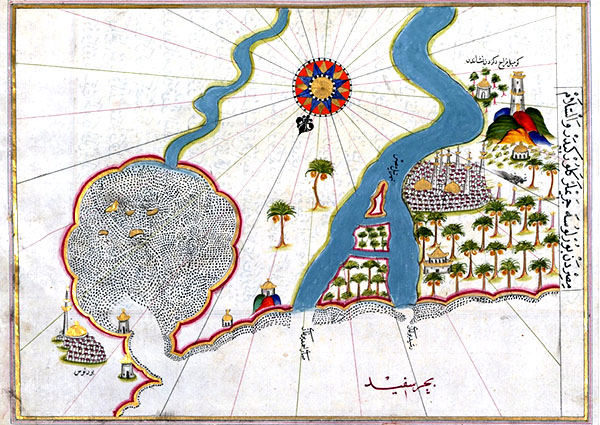Who are you and where do you come from? It’s a doubled question, as ancient as the first venturer who encountered an unknown face; the first, who are you?, inextricably linked to the second, where do you come from? We are defined by place, we are where we are known: among our clan and culture. And we are bound by our nation-state, that delineated byproduct of fifteenth-century economics, mapping, and political systems, which developed over the following centuries to both unite and divide us, to cohese our variations into stories of nationalism. “National identity,” writes Simon Schama in Landscape and Memory, “would lose much of its ferocious enchantment without the mystique of a particular landscape tradition: its topography mapped, elaborated, enriched as a homeland.”
In this final special issue of 2015, Boundaries of Nations, we bring you a complex array of what national and personal identity mean in this uprooted, transient era where home can be defined by the clothes on your back and the borders you can’t cross. Annia Ciezadlo writes from Mytilene, the capital of the Mediterranean island of Lesvos—whose inhabitants still recount being, in turn, either Turks or Greeks—as today’s immigrants (or refugees? or migrants?) scramble over Lesvos’s rocky hillsides on their desperate way to Europe. Recalling those who poured into the US after World War I, Ciezadlo writes, “Newspapers and politicians and radio commenters referred to the immigrants as a natural disaster, an enemy invasion, a sickness. Above all, they spoke of them as a liquid: an ocean, a tide, a flood. Such is the power of this image, this fear of fluidity and motion.”
Dinaw Mengestu, in “Returning to Ethiopia,” never suspected that his father’s bedtime stories were tales set in the country he fled in 1978, until twenty-five years later, when Mengestu returned to the “perfect green hills” and “tumbling streams” of his birth country. Exile was, Mengestu writes, “a state, one with its own increasingly entrenched borders that made it difficult, perhaps even impossible to see what was on the other side.”
But even sides, borders, landscapes are of human creation. “If there’s a case to be made for cartography as something distinct from visualization, it’s that spatial data, or geographic knowledge more broadly, raises a distinct set of political questions about spatial governance and identity,” historian Bill Rankin tells Columbia University’s Laura Kurgan. “There are two ways I’m trying to radicalize cartography,” Rankin explains. “The first is to place more emphasis on social landscapes. The second is to reimagine boundaries…. [B]y making new kinds of maps we can start to think about boundaries in new ways.”
New poetry by Aliah Lavonne Tigh and Yosefa Raz expands what we think of as edges, regions, and bodies. “Lying down in front of me, you say, / Use my miles of hard concrete to / run away—I’m bigger than / your Middle East, / than your deeper South—,” writes Tigh.
Violet Lucca interviews Mediterranea filmmaker Jonas Carpignano about his life in Rosarno, Italy, where pop music is just enough to unite the disparate migrants who have made the small town their home, to the consternation and occasional anger of prior residents. After Rosarno erupted in riots in 2010, Carpignano decided to film there. Media coverage, he tells Lucca, “put the entire riot into a context defined by Western values and Western ideas of the way society functions. That frustrated me…. [T]here’s another perspective on this continent, in this country, that is not ours.”
Author Atossa Araxia Abrahamian, in a piece about the global passport trade, writes, “[W]hen you exist among strangers alone, you become less foreign to yourself. No one knows who you are. It’s up to you to decide.” But travel, she acknowledges, is a privilege for those with the right passports. Julie Schwietert Collazo interviews Rachel Price about her new book, which examines how the normalization of US-Cuba diplomacy is changing environmental art on the island. Price tells Collazo, “[T]here’s such a long tradition of the arts being very prominent and very varied in Cuban culture and society, people do use the art world as a space for critical reflection.”
Plus, two new short stories. First, Valeria Luiselli layers fictional roles into the lives of fictional characters who’ve accepted historical reenactment jobs in the bullet-dodging days of New Mexico’s Wild West. “Our lives were free and unconstrained: they were far away from…that country out there, which was always advancing on its unforgiving path toward progress and power; far from that cruel and loveless country beyond the last little shack in our town.” And Jeff Parker’s Vyacheslav pines for his mother’s chicken hearts with pasta, drinks with his friend Rafik, contemplates how to get out of army conscription, and plays his beloved Russian billiards: “The constitution of Amerikanka declares all balls equal.”
And Guernica’s Dan Sheehan interviews Jasminko Halilović about the children who survived the Bosnian War. Halilović’s childhood is scarred with memories of brutal shelling and assault. Founder of the War Childhood Project and Museum, which collects the memories and possessions of those children who survived the war, Halilović tells Sheehan, “We have to approach the concept of resilience cautiously, not letting it become an excuse for adults to continue with armed conflicts. The fact that some children successfully cope with the adversities and memories of war…doesn’t mean that around us, in all the conflict and post-conflict zones, the lives of people who grew up during wartime haven’t been forever changed by this experience.”
Features:
Dinaw Mengestu: Returning to Ethiopia
Atossa Araxia Abrahamian: Among Strangers
Francisco Cantú: Mission Trail
Jonathan Weisman: A Britain Beyond Costume
Interviews:
Children of War: Dan Sheehan interviews Jasminko Halilović
One Song: Violet Lucca interviews Jonas Carpignano
Seeing Cities: Laura Kurgan in conversation with Bill Rankin
Art:
Locating Cuba: Julie Schwietert Collazo interviews Rachel Price
Fiction:
Valeria Luiselli, translated by Christina MacSweeney: Shakespeare, New Mexico
Poetry:
Aliah Lavonne Tigh: Love American-Made/ Your Toy Ode:Us
Yosefa Raz: [I too drag around tin cans]
